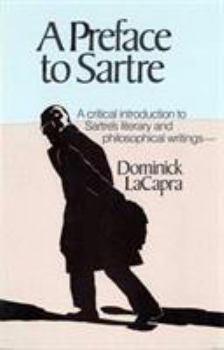A Preface to Sartre
Select Format
Select Condition 
Book Overview
Perhaps the leading Western intellectual of his time, Jean-Paul Sartre has written highly influential works in a diverse number of subject areas: philosophy, literature, biography, autobiography, and the theory of history. The concise and lucidly-written A Preface to Sartre discusses the French philosopher's contributions in all of these fields. Making imaginative use of the insights of some of the most important contemporary French thinkers (notably Jacques Derrida), Dominick LaCapra seeks to bring about an active confrontation between Sartre and his critics in terms that transcend the opposition between existentialism and structuralism. Referring wherever appropriate to important events in Sartre's life, he illuminates such difficult works as Being and Nothingness and the Critique of Dialectical Reason , and places Sartre in relation to the traditions that he has explicitly rejected. LaCapra also offers close and sensitive interpretations of Nausea , of the autobiography, The Words , and of Sartre's biographical studies of Baudelaire, Genet, and Flaubert. "I envision intellectual history," writes laCapra, "as a critical, informed, and stimulating conversation with the past through the medium of the texts of major thinkers. Who else in our recent past is a more fascinating interlocutor than Sartre?"
Format:Paperback
Language:English
ISBN:0801494486
ISBN13:9780801494482
Release Date:January 1987
Publisher:Cornell University Press
Length:256 Pages
Weight:0.05 lbs.
Customer Reviews
1 rating
French Philosophy...The Next Generation
Published by Thriftbooks.com User , 24 years ago
If the only thing you read in this book is the first chapter, it will have been worth every penny you spent on it. Dominick LaCapra is merciless in his approach to Sartre's philosophy from the point of view of post-modern textual analysis. The book might also be described as "the student (LaCapra) of the student (Derrida) takes on the professor (Sartre)." But, if that in any way minimizes LaCapra, I would be wrong to suggest it. This generation of French philosophy is out to do nothing less than rewrite all of intellectual history. And LaCapra is one of their foremost spokesmen. This is no small task, the results of which have yet to be seen. LaCapra, in this and other works, makes a formidable argument as to why this needs to be done. And Sartre, of course, is one of the icons that needs to be dealt with. In some ways, this particular book is somewhat unsatisfying. But, it serves to make its point. The battle lines have been drawn. Even Michel Foucault is seen as "the older generation" from this vantage point. Quite interesting, as intellectual works go.





